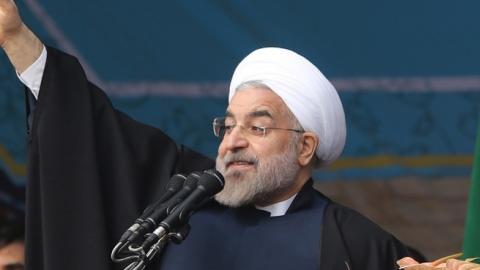Remember April Glaspie? In 1990, she was President George H. W. Bush’s ambassador to Iraq. During her first meeting with Saddam Hussein, rather than using blunt language to tell the Iraqi dictator that the U.S. was opposed to any act of military aggression by his nation against Kuwait, she opted instead to employ far more opaque phrasing, saying, “we have no opinion on your Arab-Arab conflicts.” In doing so, Glaspie may well have inadvertently led Saddam Hussein to believe that he would receive little more than a verbal condemnation for invading Kuwait, thereby setting the stage for two American wars and thousands of casualties. War was not Glaspie's intention on that July day, but Iraq’s strongman misinterpreted her words.
In 1950, a similar lack of diplomatic clarity by then Secretary of State Dean Acheson, who implied that South Korea lay outside of the U.S.’s “defense perimeter,” helped incite North Korea to invade the South. The North mistakenly believed that the U.S. government would not intervene to defend South Korea. Today the Obama Administration may be inadvertently leading us toward a similar tragedy. Only this time, the dictator in question is Iran’s Ayatollah Khamenei and the likely casualties will be the Israelis.
Last week while the terms of the Iranian nuclear deal were being written in Lausanne, Iran issued a statement saying that the destruction of Israel was non-negotiable. The Obama Administration chose not to address this comment. By ignoring Iran's statement, our diplomats may have been unwittingly sending a signal that the annihilation of the Jewish state is permissible. Of course, the Obama Administration does not want Iran to attack Israel. But Ambassador Glaspie did not intend for Saddam to attack Kuwait either, nor did Secretary Acheson wish for North Korea to cross the 38th parallel and strike at the South.
In an interview with New York Times columnist Thomas Friedman on Saturday, President Barack Obama stressed the “deep affinities I feel for the Israeli people and for the Jewish people,” and his frustration with critics who claim that his “administration has not done everything it could to look out for Israel’s interest.” No doubt the Iranian leadership is reading this interview very carefully for further insight into the United States’ stance as the negotiations move forward, which is why President Obama’s words are critical, both for what he did say and particularly for what he did not say. The most important words in the interview may be these: “What I am willing to do is to make the kind of commitments that would give everybody in the neighborhood, including Iran, a clarity that if Israel were to be attacked by any state, that we would stand by them.”
The glaring omission in this sentence and in the interview as a whole is that Mr. Obama did not tell Iran not to attack Israel. The President did not explicitly say that Iran must stop calling for the destruction of Israel. Nor did he say that such threats against Israel are “unacceptable" and "non-negotiable" for the United States. While our media may be willing to overlook Mr. Obama's choice of words, we can be certain that the Iranians who are parsing this interview will notice this glaring presidential omission. And given Mr. Obama’s general reluctance to use force anywhere, particularly his decision to walk back of his own red line statement on the Syrian regime’s use of chemical weapons, the Iranians may well suspect that an attack on Israel will not provoke any serious military response from the United States while Barack Obama is President.
Moreover, throughout last year's nuclear negotiations, Iran has repeatedly called for the annihilation of Israel. And each time, these words have been met by silence on the part of the United States. For example, in a meeting last July with Iranian college students, the Iranian news service, Fars News Agency, reported that Ayatollah Khamenei said, “The only solution is its (Israel’s) destruction . . . Israel must be destroyed.” In November, Khamenei further tweeted that "This barbaric, wolflike & infanticidal regime of #Israel which spares no crime has no cure but to be annihilated.”
These are strong, incendiary words. They deserve a reply, if not from the President himself then at least from the Administration. Yet last Friday during the State Department’s daily press briefing, when Acting Spokesperson Marie Harf was asked point blank if the issue of Iran’s statements on the destruction of Israel should be included in any agreement, she replied: ”No, this is an agreement that doesn’t deal with any other issues, nor should it.” The President reiterated this stand on Monday in an interview with NPR’s Morning Edition when he called making the nuclear deal contingent on Iran recognizing Israel “a fundamental misjudgment.” Once again at a crucial moment, the Obama Administration missed an opportunity to state that Israel has a right to exist, as well as to reaffirm that Israel is both an essential American ally and that the U.S. categorically rejects any statements calling for Israel’s destruction.
Indeed, even if Israel’s right to exist is not part of any nuclear agreement, the U.S. State Department could still have taken that moment to reiterate America’s commitment to Israel and to warn against any attack on the state. Not doing so could be interpreted as a green light for Iran to attack, just as nearly a quarter-century ago, Saddam Hussein heard April Glaspie say that it was permissible for Iraq to invade Kuwait, or 65 years ago, North Korea believed it could lay claim to South Korea. In none of these cases would the interpretation be correct, but thus far, the outcome has been the same: tragic.

















